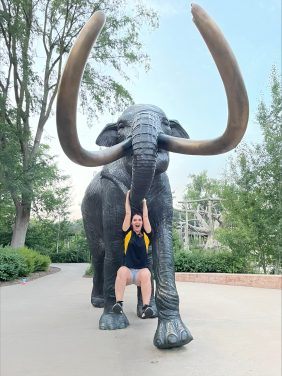Published on
Updated on
Published 3/28/2024
Story contact: Nicholas Childress, CVMMarCom@missouri.edu

Nicole Scarberry, a fourth-year veterinary student and member of the University of Missouri College of Veterinary Medicine Class of 2024, recently completed an externship at Omaha’s Henry Doorly Zoo and Aquarium in Nebraska. The six-week block exposed Scarberry to cases involving elephants, sharks, gorillas, bison, seals, giraffes, rhinoceroses, and in one case, an alligator with an appetite for coins.
Scarberry, who is originally from Avon, Ohio, and a graduate of the University of Findlay, initially became interested in zoologic medicine when she volunteered at the Toledo Zoo and took her first trip to Africa during her pre-veterinary medicine studies. “My long-term goals are to pursue zoologic medicine, but I have a heavy interest in research, theriogenology and internal medicine, which I hope to incorporate into my future career,” she said.
Scarberry’s interest in zoologic medicine led her to the externship at OHDZA, as well as seeing cases at the Lee Simmons Wildlife Safari Park. She had prior experience with the amphibian team at the zoo, completing research during her second and third year of veterinary school alongside them. After applying and being accepted for the externship two and a half years in advance, she joined the team of six veterinarians, technicians, house officers, and staff to assist with the thousands of animals in their care.
“Every day was a new adventure, and I learned a lot from several different viewpoints,” said Scarberry. “Since the team also knew my interest in theriogenology, I was able to spend a couple days with the Reproductive Sciences Department, doing ultrasound scans and gamete rescues.”
One specific case brought national attention to the zoo, when a 36-year-old leucistic American alligator was found to have ingested 70 coins. The coins were discovered when the alligator, named Thibodaux, a fan favorite at OHDZA, received a routine examination. According to the zoo’s official statement on Facebook, foreign metal objects in the stomach were identified during blood collection and radiographs, which are included in normal examinations.
On Feb. 15, Thibodaux underwent surgery. Christina Ploog, DVM, an associate veterinarian at OHDZA, explained the process in the official statement. “With the help of his training, Thibodaux was anesthetized and intubated to allow us to safely manage him during the procedure,” said Ploog. “A plastic pipe was placed to protect his mouth and safely pass the tools used to access the coins, such as a camera that helped us guide the retrieval of these objects.”
Scarberry played a role in the anesthesia process. “Under the guidance of the veterinary staff close by, I monitored anesthesia for the gator,” said Scarberry. “This included manually ventilating the animal for the nearly four-hour procedure, which turned out to be quite the workout.”
According to the zoo, the coins were successfully removed, which was confirmed by radiographs. Thibodaux recovered well from the procedure and returned to his habitat. In its statement, the zoo emphasized that guests should not throw coins into any bodies of water at the zoo.
Scarberry says she is grateful for the opportunity to work so closely with the animals and team. “Retrieving the coins is just a small insight into the hard work that hospital staff do every day,” she said. “I was intimately involved in all the cases while I was there as a student, and I appreciate the team’s trust in my veterinary training. I found amazing mentors in the staff in Omaha and am very thankful for my time there. I have never felt so supported, yet still pushed very hard academically.”
Scarberry, who will be staying at Mizzou after graduation to work as a large animal rotating intern, is now working on a five-week externship in Melbourne, Florida, at Brevard Zoo and Sea Turtle Healing Center.